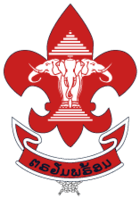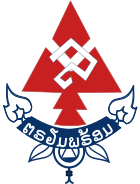Scouts Lao
At the present time, there is no known Scouting program in Laos, one of only four of the world's independent countries that do not have Scouting.

In the 1930s, André Lefèvre, chief of the Eclaireurs de France, set up a training camp for 60 Scoutmasters from all over French Indochina. At the end of 1937, French Scouting sent Scoutmaster Raymond Schlemmer to the Cambodian, Laotian, and Vietnamese areas of Indochina to oversee the setting up of the Fédération Indochinoise des Associations du Scoutisme (FIAS, Indochinese Federation of Scouting Associations) in all three regions.
From 1939 through 1945, the political situation affected Scouting activities all across the country, as World War II engendered a movement for an independent Laos. The French began to lose control and were finally overthrown by Japanese intervention. This ceased the French Scouts' activity in Laos, as well as all Scouting activities.
Homegrown Scouting was once again active in Laos, as Scouts Lao (Laotian: ສກຸດລາວ, pronounced skudlao) between its inception in 1959, at which date it numbered 2,300 Scouts, and its banning by the Pathet Lao in 1975.
Laotian Scouting in exile existed at least into the early 1990s in Los Angeles, alongside fellow Vietnamese Scouting in exile and Cambodian Scouting in exile groups.
According to Eric Khoo Heng-Pheng of the World Organization of the Scout Movement, "We hope to work on (Laos and Burma) again... Laos is the closest, as we have got Cambodia in already... Just like Vietnam... we are working with them through ASEAN Scouting. We hope to enroll all the countries including China in (the Asia-Pacific Scout Region)."
The Scout Motto is ຕຣຽມພຣ້ອມ (Triam Phrom /tliaːm˨ pʰlɔːm˦˩/), Prepared in Lao, and Sois Prêt, Be Prepared in French.
See also
References
- Facts on World Scouting, Boy Scouts International Bureau, Ottawa, Canada, 1961

